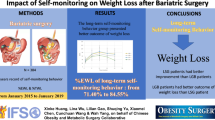Abstract
Background
The aim of this study was to correlate the connection between self-management behaviors and anthropometric indices after Roux-en-Y gastric bypass (RYGB).
Methods
A sample of 180 patients suffering from obesity were treated with RYGB in 2019; 6 and 18 months after surgery, anthropometric indices, including weight, waist circumference, waist- to-height ratio, body mass index (BMI), and waist-to-hip ratio, were gauged, and participants completed the post-bariatric surgery self-management behaviors questionnaire.
Results
Correlation matrix results showed that all anthropometric indices had a significant positive relationship with self-management behaviors after RYGB; the results of the 18-month post-surgical follow-up exhibited no significant difference between anthropometric indices and self-management behaviors, 6 and 18 months after surgery.
Conclusion
Therefore, the more self-management behaviors increase, the greater decrease in anthropometric indices will happen after RYGB.
Similar content being viewed by others
Change history
19 March 2021
A Correction to this paper has been published: https://doi.org/10.1007/s00268-021-06069-5
References
Inge TH, Courcoulas AP, Jenkins TM, Michalsky MP, Helmrath MA, Brandt ML, Harmon CM, Zeller MH, Chen MK, Xanthakos SA, Horlick M (2016) Weight loss and health status 3 years after bariatric surgery in adolescents. N Engl J Med 374(2):113–123
Leitzinam MF, Moore SC, Koster A, Harris TB, Park Y, Hollenbeck A, Schatzkin A (2011) Waist circumference as compared with body-mass index in predicting mortality from specific causes. PLoS ONE 6(4):e8582
Ash Well M, Gunn P, Gibson S (2012) Waist-to-height ratio is a better screening tool than waist circumference and BMI for adult cardiometabolic risk factors: systematic review and meta-analysis. Obes Rev 13(3):275–286
Livhits M, Mercado C, Yermilov I, Parikh JA, Dutson E, Mehran A, Ko CY, Gibbons MM (2010) Behavioral factors associated with successful weight loss after gastric bypass. The American Surgeon. 76(10):1139–1142
Rojhani-Shirazi Z, Amini M, Meftahi N, Sepehrimanesh M, Poorbaghi SL, Vafa L (2017) Comparison of anthropometric measures in people with and without short-and long-term complications after laparoscopic sleeve gastrectomy. Comp Clin Pathol 26(6):1375–1379
McCaul KD, Glasgow RE, Schafer LC (1987) Diabetes regimen behaviors. Predicting adherence Med Care 25(9):868–881
Theofilou P, Reyes Saborit A (2012) Health locus of control and diabetes adherence. J Psychol Psychother 3:2161–0487
Allied Health Sciences Section Ad Hoc Nutrition C et al (2008) ASMBS allied health nutritional guidelines for the surgical weight loss patient. Surg Obes Relat Dis 4(5):573–108
Mechanick JL, Youdim A, Jones DB, Garvey WT, Hurley DL, McMahon MM, Heinberg LJ, Kushner R, Adams TD, Shikora S, Dixon JB (2013) Clinical practice guidelines for the perioperative nutritional, metabolic, and nonsurgical support of the bariatric surgery patient—20 13 update: cosponsored by American Association of Clinical Endocrinologists, the Obesity Society, and American Society. Surg Obes Relat Dis 9(2):159–191
Sobhani Z, Amini M, Hosseini SV et al (2020) Self-efficacy, happiness and psychological well-being after sleeve gastrectomy. World J Surg 44:4193–4196. https://doi.org/10.1007/s00268-020-05761-2
Andreu A, Jimenez A, Vidal J, Ibarzabal A, De Hollanda A, Flores L, Cañizares S, Molero J, Moizé V (2020) Bariatric support groups predicts long-term weight loss. Obes Surg 6:1–6
Sobhani Z, Amini M, Zarnaghash M, Hosseini SV, Foreman HR (2019) Self-management behaviors in obese patients undergoing surgery based on general and specific adherence scales. World J Plast Surg 8(1):85
Wei YF, Wu HD, Chang CY, Huang CK, Tai CM, Hung CM, Tseng WK, Wu CC (2010) The impact of various anthropometric measurements of obesity on pulmonary function in candidates for surgery. Obes Surg 20(5):589–594
Welch G, Wesolowski C, Piepul B, Kuhn I, Rornanelli I, Garb J (2008) Physical activity predicts weight loss following gastric bypass surgery: findings from a support group survey. Obes Surg 8(5):517–524
Sobhani Z, Ahadi H, Khosravi S, Poursharifi H, Seirafi M (2017) Psychometric indices of post bariatric surgery self-management behaviors questionnaire. I Arak Eni Med Sci 20(1):84–95
Khosravi S, Amini M, Poursharifi H, Sobhani Z, Sadeghian L (2018) The effectiveness of information- motivation-behavioral model on improving the weight and body size among women undergoing bariatric surgery. LSMJ 21(1):81–91
Elhag W, El Ansari W, Abdulrazzaq S, Abdullah A, Elsherif M, Elgenaied I (2018) Evolution of 29 anthropometric, nutritional and cardiometabolic parameters among morbidly obese adolescents 2 years post sleeve gastrectomy. Obes Surg 28(2):474–482
Sobhani Z, Ahadi H, Khosravi S, Pourshrifi H, Seirafi M (2017) The effectiveness of motivational interviewing on adherence in obese patients undergoing sleeve gastrectomy surgery. Armaghane Danesh 21(12):1218–1235
Livhits M, Mercado C, Yermilov I, Parikh JA, Dutson E, Mehran A, Ko CY, Gibbons MM (2010) Exercise following bariatric surgery: systematic review. Obes Surg 20(5):657–665
Jiménez-Loaisa A, González-Cutre D, Beltrán-Carrillo VJ, Alcaraz-Ibáñez M (2020) Changes in bariatric patients’ physical activity levels and health-related quality of life following a postoperative motivational physical activity intervention. Obes Surg 14:1–1
Acknowledgement
This article is the result of research project number 18570 at Shiraz University of Medical Sciences. We would like to show our gratitude to the staff of the Laparoscopy Research Center and Obesity Clinic, Shiraz Ghadir Mother and Child Hospital, who helped and assisted this research. The authors also thank all the participants involved in this research study for their sincere cooperation.
Author information
Authors and Affiliations
Corresponding author
Ethics declarations
Conflict of interest
The authors declare that they have no conflict of interest.
Ethical approval
This study was approved by the research ethics committee of University of Medical Sciences.
Informed consent
Informed consent was obtained from all individual participants included in the study.
Additional information
Publisher's Note
Springer Nature remains neutral with regard to jurisdictional claims in published maps and institutional affiliations.
The original online version of this article was revised: The city name of the affiliation for Maryam Zarnaghash was corrected.
Rights and permissions
About this article
Cite this article
Sobhani, Z., Amini, M., Zarnaghash, M. et al. Self-management Behaviors and Anthropometric Indices after Roux-en-Y Gastric Bypass. World J Surg 45, 1812–1817 (2021). https://doi.org/10.1007/s00268-021-05959-y
Accepted:
Published:
Issue Date:
DOI: https://doi.org/10.1007/s00268-021-05959-y




